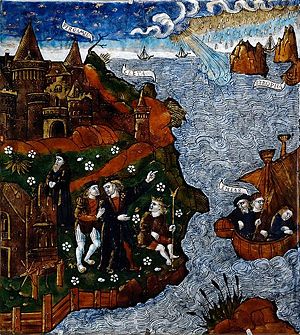Penates: Difference between revisions
imported>Thomas Wright Sulcer (created page; got picture) |
Pat Palmer (talk | contribs) m (Text replacement - "[[Troy|" to "[[Troy (ancient city)|") |
||
| Line 3: | Line 3: | ||
'''Penates''' or '''Di Penates''' were in [[Religion in ancient Rome|ancient Roman religion]] were [[household deity|household deities]] or ''dii familiares''. They were an important part of Roman religion. When a [[family]] ate a meal, they put some food on the fire as an [[offering (religion)|offering]] to the [[Roman god|gods]]. They are portable deities which can be moved from place to place. | '''Penates''' or '''Di Penates''' were in [[Religion in ancient Rome|ancient Roman religion]] were [[household deity|household deities]] or ''dii familiares''. They were an important part of Roman religion. When a [[family]] ate a meal, they put some food on the fire as an [[offering (religion)|offering]] to the [[Roman god|gods]]. They are portable deities which can be moved from place to place. | ||
In the ''[[Aeneid]]'' by the [[Ancient Rome|Roman]] [[poetry|poet]] [[Virgil]], the Penates were brought by [[Troy|Trojan]] hero [[Aeneas]] along with his father [[Anchises]] and his son [[Ascanius]] on a long voyage which included a trip to [[Carthage]] to visit princess [[Dido]] as well as [[Sicily]] and finally to [[Italy]] where Aeneas founded the city of [[Rome]]. Scholars such as [[Elizabeth Vandiver]] suggest that there is strong consensus that the ''Penates'' were a Roman construction that didn't exist around the time of the [[Trojan war]], and as a result, the [[Aeneid]] was contrived as a kind of [[myth]] to suggest to Roman readers that the Penates originated from Trojan roots. Some scholars believe the Penates marked the ascendancy of the Roman family as an institution. | In the ''[[Aeneid]]'' by the [[Ancient Rome|Roman]] [[poetry|poet]] [[Virgil]], the Penates were brought by [[Troy (ancient city)|Trojan]] hero [[Aeneas]] along with his father [[Anchises]] and his son [[Ascanius]] on a long voyage which included a trip to [[Carthage]] to visit princess [[Dido]] as well as [[Sicily]] and finally to [[Italy]] where Aeneas founded the city of [[Rome]]. Scholars such as [[Elizabeth Vandiver]] suggest that there is strong consensus that the ''Penates'' were a Roman construction that didn't exist around the time of the [[Trojan war]], and as a result, the [[Aeneid]] was contrived as a kind of [[myth]] to suggest to Roman readers that the Penates originated from Trojan roots. Some scholars believe the Penates marked the ascendancy of the Roman family as an institution. | ||
==References== | ==References== | ||
{{Reflist}} | {{Reflist}} | ||
Latest revision as of 08:39, 22 February 2023

Penates or Di Penates were in ancient Roman religion were household deities or dii familiares. They were an important part of Roman religion. When a family ate a meal, they put some food on the fire as an offering to the gods. They are portable deities which can be moved from place to place.
In the Aeneid by the Roman poet Virgil, the Penates were brought by Trojan hero Aeneas along with his father Anchises and his son Ascanius on a long voyage which included a trip to Carthage to visit princess Dido as well as Sicily and finally to Italy where Aeneas founded the city of Rome. Scholars such as Elizabeth Vandiver suggest that there is strong consensus that the Penates were a Roman construction that didn't exist around the time of the Trojan war, and as a result, the Aeneid was contrived as a kind of myth to suggest to Roman readers that the Penates originated from Trojan roots. Some scholars believe the Penates marked the ascendancy of the Roman family as an institution.